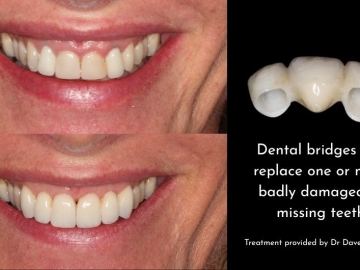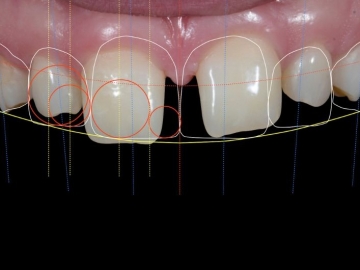
Posted on: 30 September, 2020
Smiles can show signs of ageing like any other part of the body, but there are ways to rejuvenate your smile. Find out more with Mount Lawley Dental.
3 minute read
Our teeth and mouths change as we age, like any other part of the body, and these changes can affect our oral health as well as appearance. While some smile changes are part of natural ageing, others are down to bad habits or lifestyle factors, and these effects may be prevented or reduced when you know how.
Read this short guide to find out the most common ways age can impact on your smile and what can be done about it. Alternatively, discover how we can enahnce your smile, by booking a complimentary smile consultation with our cosmetic dentist, Dr Lewis Moore.
We use our teeth every day, and even with a lifetime of good brushing, flossing and dental check-ups, this constant use can take its toll. Years of chewing, tearing and grinding can wear down the hard outer surface of teeth (the enamel), exposing the softer dentine layer beneath. Erosion from acidic drinks such as wine, soft drinks and fruit juice can also dissolve the enamel over time.
Teeth that have lost enamel can be damaged more easily by impacts or biting down on something hard. They may also feel more sensitive to temperature and pressure, although since the nerves in teeth lose sensitivity with age, you may not notice any discomfort.
Tooth wear can be minimised by following good oral hygiene, cutting down on sugar and acid in your diet, and consuming more calcium and tap water containing fluoride that can help to strengthen teeth. You should also try to drop any bad habits that could be accelerating tooth wear, such as tooth grinding (bruxism) or chewing objects such as pens and fingernails.
If your teeth are already worn or damaged, your dentist may recommend a restorative treatment such as inlays/onlays or dental crowns to help restore their strength and appearance, as well as a custom mouthguard to avoid any future impact from teeth grinding.
Loss of tooth enamel with age also has the effect of making teeth appear more yellow, as the naturally yellow dentine shows through the slightly translucent enamel. Stains from strong food and drink pigments, tobacco and certain medications can also contribute to tooth discolouration over time, which can be avoided.
If you want to restore whiteness to your teeth, your dentist may be able to help. Professional cleaning and scaling may remove some surface stains and plaque from your teeth, but for more dramatic results, your dentist might recommend a cosmetic treatment such as teeth whitening or veneers. They should explain what each treatment involves and what the possible risks and costs are so you can decide if cosmetic dentistry is right for you.
Another common effect of ageing for many people is that bones get weaker. If this happens to the jaws, they can start to shrink inwards, causing teeth to gradually shift position or become crooked or crowded. As well as affecting your appearance, shifting teeth may also affect speech or eating and nutrition, and may increase your risk of oral health problems if it becomes more difficult to brush and floss.
If your dentist notices that your teeth are starting to shift position, they may recommend a teeth straightening treatment to straighten your teeth and bring your bite back into proper alignment. While orthodontics is commonly associated with teenagers, many adults now choose to straighten their teeth later in life following the introduction of more discreet straightening treatments such as tooth-coloured braces and clear aligners, like Invisalign® treatment.
Age is also a factor for oral health problems, the most common being tooth decay and gum disease. These diseases are caused by bacteria that build up on the teeth in the form of plaque and eventually reach the gums. As well as causing pain and discomfort, tooth decay or gum disease that is left untreated may eventually cause permanent damage such as receding gums or tooth loss.
Gum disease is more common with age, and its effects become more severe the longer the condition goes untreated. According to the most recent national survey of oral health, more than half of Australians over the age of 65 (53.4%) had gum disease. Your risk factor will be higher if you smoke, you're overweight or you have a related condition such as heart disease or diabetes. Having gum disease can also increase your risk of developing heart disease, stroke and other serious health conditions.
Tooth decay and gum disease can usually be treated successfully in their early stages through a combination of daily oral care and hygiene treatments at a dental clinic. If your dentist diagnoses more advanced decay or gum (periodontal) disease, they may recommend treatments such as antibiotics, root planing to disinfect the gum, a tooth filling to repair a cavity, or in more severe cases an extraction or surgery.
Thanks to improved oral health education and improved access to dental care, growing older no longer means losing your teeth as it once did. However, whether it's due to gum disease, extractions or accidental injury, it makes sense that the average number of missing teeth increases with age.
Australians over 65 had an average of 10.8 missing teeth in 2013, with almost one in five (19%) having no natural teeth remaining. As well as leaving gaps in your smile, missing teeth that aren't replaced may cause problems with eating and speaking. Without support, the teeth on either side of a gap can also shift, the jaw can start to deteriorate around the absent tooth and the facial muscles could start to sag, leading to a more aged appearance.
Dentists recommend replacing missing teeth to prevent these problems and restore the look and function of your smile. The most common tooth replacement options are dental implants, bridge or dentures. Your dentist can give you all the information you need to make an informed decision about which treatment is right for your circumstances.
If you're concerned about your oral health or thinking about making any changes to your smile, make an appointment with our dentists at Mount Lawley Dental to find out what your options are.
Call our team today on (08) 9227 8777 or book a cosmetic consult today.
Invisalign® aligners are a registered medical device. Always read the label and follow and instructions for use from your dentist.

Bridges: A Cost-Effective Solution for Missing Teeth

5 Facts on Digital Smile Design

How Much Does a Smile Makeover Cost